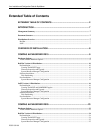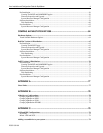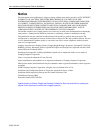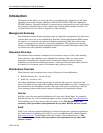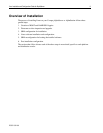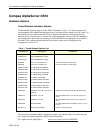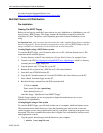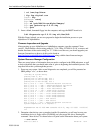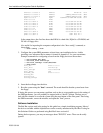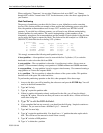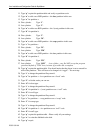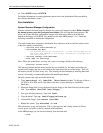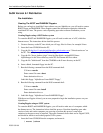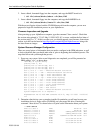
Linux Installation and Configuration Guide for AlphaServer 10
ECG513/0100
For Alpha Systems Supported Options List:
http://www.digital.com/alphaserver/products/options.html
Red Hat Version 6.0 Distribution
Pre-Installation
Creating The BOOT Floppy
Before you can begin to install the Linux software on your AlphaServer or AlphaStation, you will
need to create a BOOT floppy. This floppy contains the information required to initiate the
installation of Linux. The process varies depending upon what software distribution you are
using.
An important note: Our experience has shown that the vendor supplied floppy images sometimes
do not work properly. You are therefore encouraged to create your own BOOT floppy using the
images available over the Internet, as described in the sections that follow.
Creating floppies using a MS/Windows system
To create the BOOT floppy, you will need to make use of a PC, which has Internet access. The
instructions below detail the process:
1. Create a directory on the PC into which you will copy files for Linux, for example \Linux.
2. Connect to the URL ftp://ftp.digital.com/pub/DEC/Linux-Alpha/Images/ which is a directory
containing the boot floppy image files.
3. Copy the generic-up.2.2.12.img file to your PC.
4. Rename the file to generic.img (DOS has an 8.3 file name limitation)
5. Insert the Linux CD-ROM into the PC.
6. Copy the file "\dosutils\rawrite.exe" from the CD-ROM to the \Linux directory on the PC.
7. Insert a blank, formatted floppy into the PC.
8. Run the following command from the DOS command shell:
C:\Linux> rawrite
Enter source file name: generic.img
Enter destination drive: a
Label this floppy "AlphaServer Linux BOOT Floppy".
With this floppy in hand, you are now prepared to begin the installation process on your
AlphaServer or AlphaStation.
Creating floppies using an Unix system
To create the BOOT floppy, you will need to make use of a computer, which has Internet access.
The instructions below detail the process. Note that depending upon what version of unix and
vendor computer you are using to perform this process, some minor variations in the process may
be required. The exact commands shown here are for Digital Unix, and should be similar to most
other popular unix systems.
1. Copy the generic kernel images from the Internet to your computer:
$ mkdir /var/tmp/Linux



